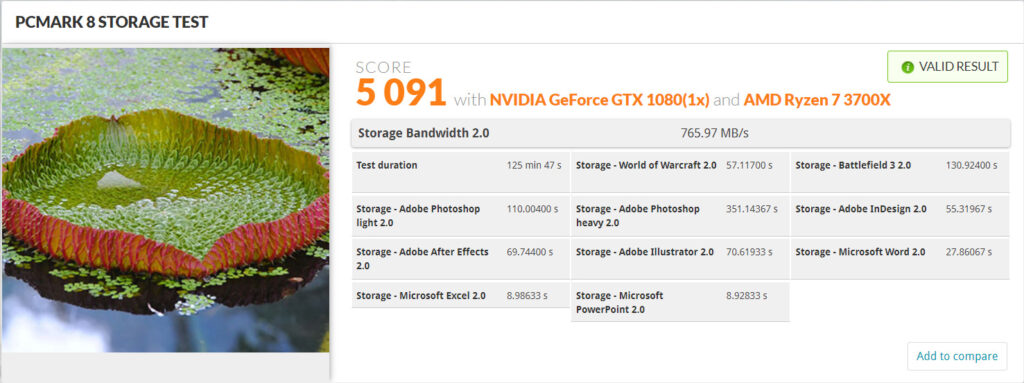The SSD Review uses PCMark 8’s Storage test suite to create testing scenarios that might be used in the typical user experience. With 10 traces recorded from Adobe Creative Suite, Microsoft Office and a selection of popular games, it covers some of the most popular light to heavy workloads. Unlike synthetic storage tests, the PCMark 8 Storage benchmark highlights real-world performance differences between storage devices. After an initial break-in cycle and three rounds of the testing, we are given a file score and bandwidth amount. The higher the score/bandwidth, the better the drive performs.
AMD X570 TEST BENCH
INTEL Z590 TEST BENCH

PCMARK 10 FULL SYSTEM STORAGE BENCHMARK
PCMark 10 Storage Benchmarks produce an overall score as a measure of drive performance. Comparing devices is as simple as comparing scores. The tests also measure and report the bandwidth and average access time performance for the drive. Each test uses traces recorded while performing real-world tasks such as booting Windows 10, starting applications such as Adobe Photoshop and Illustrator, working with applications such as Microsoft Excel and PowerPoint, and copying several large files and many small files.
AMD X570 TEST BENCH
INTEL Z590 TEST BENCH

PCMARK 10 QUICK SYSTEM BENCHMARK
The Quick System Drive Benchmark is a subset of the Full test and is more representative of typical daily usage to show what would be expected regarding hybrid SSD performance on a day-to-day basis.
AMD X570 TEST BENCH
INTEL Z590 TEST BENCH

PCMARK 8 AND PCMARK 10 COMPARISON CHART
If you have been following along and doing a comparison throughout this report, you might be of the opinion that AMD has the edge, especially when you see a difference of a few hundred megabytes in sequential testing. Looking at all three PCMark 8 and PCMark 10 results however, the Intel Test Bench has consistently provided better results, albeit it by a narrow margin for each test.
TRUE DATA TESTING THE PHISON E18 B47R GEN 4 SAMPLE SSD
For our True Data Testing, we simply loaded 15GB video, music, photo and OS files onto the E18 B47R sample SSD and copied the data to a new folder on that same disk. This was done on both the Intel and AMD Test Benches and the results as shown in this chart.
 The SSD Review The Worlds Dedicated SSD Education and Review Resource |
The SSD Review The Worlds Dedicated SSD Education and Review Resource | 

Any hints on what endurance rating we can expect? (TBW for 2TB model)
Can’t speak for the TBW – that is, warrantied writes – but the endurance on this flash should be quite good. Possibly in the 5K P/E range.
Thanks for jumping in NewMaxx…welcome anytime.
Les, would really like to see you guys adding a detailed thermal performance test for nvme drives. Thanks and keep up the good work.
Abdulaziz.
Pls pls pls, run one of these benchmarks with such modern PCIe 4 drive on “old” PCIe 3.
PCIe 3 should not tamper with those 4K random low QD speeds (but only with the sequential high QD ones) and, if that’s the case, maybe it’s time to consider such PCIe 4 drive for my PCIe 3 laptop. Really, this kind of modern drive is 2.5x faster than good PCIe 3 ones where it matters most.
I’m sorry but why is a site that is solely focused around testing SSDs not including ANY figures or testing regarding power management?
Anandtech does, and their site isn’t focused solely on SSDs